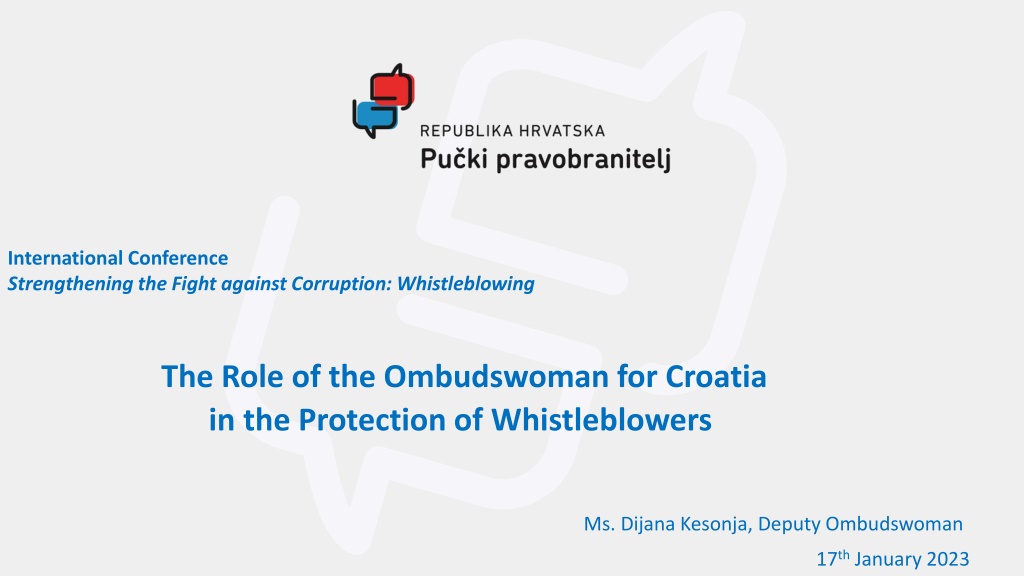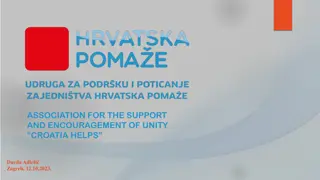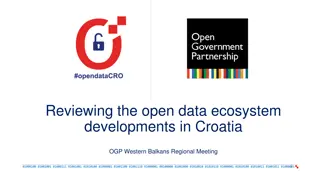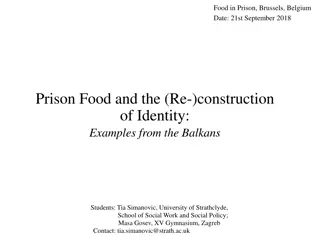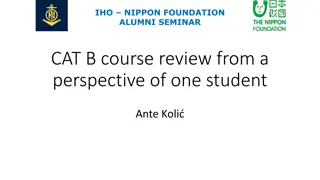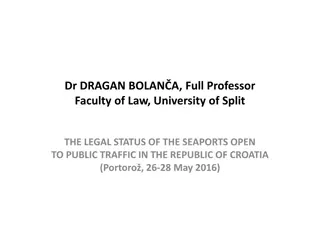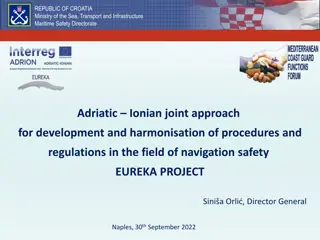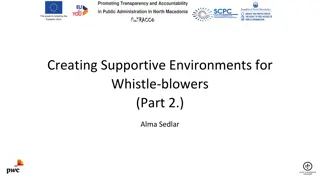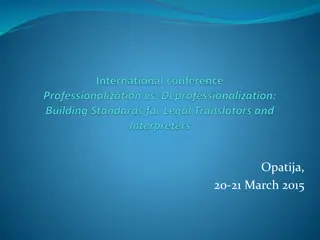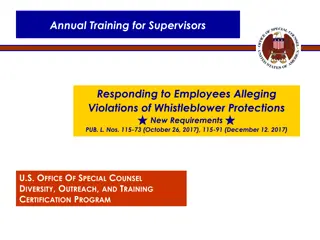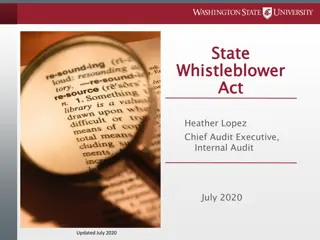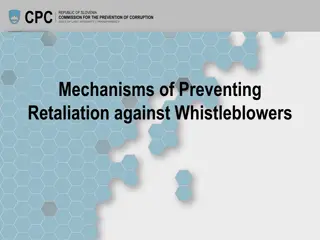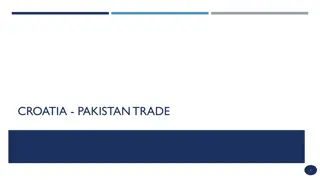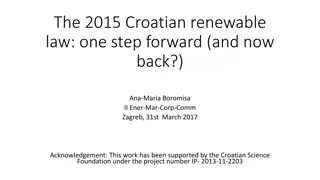Role of Ombudswoman in Protecting Whistleblowers: Insights from Croatia
Explore the crucial role of the Ombudswoman in Croatia in safeguarding whistleblowers and enhancing the fight against corruption. Delve into the legal framework, challenges, and strategies to strengthen whistleblower protection. Gain insights into the mandates and proceedings of the Ombudswoman, shedding light on reporting irregularities and upholding human rights.
Download Presentation

Please find below an Image/Link to download the presentation.
The content on the website is provided AS IS for your information and personal use only. It may not be sold, licensed, or shared on other websites without obtaining consent from the author. Download presentation by click this link. If you encounter any issues during the download, it is possible that the publisher has removed the file from their server.
E N D
Presentation Transcript
International Conference Strengthening the Fight against Corruption: Whistleblowing The Role of the Ombudswoman for Croatia in the Protection of Whistleblowers Ms. Dijana Kesonja, Deputy Ombudswoman 17thJanuary 2023
Overview of the presentation General information on the institution of Ombudswoman for Croatia Legal framework for the protection of whistleblowers in Croatia Authorities of the Ombudswoman when protecting whistleblowers Examples of reporting irregularities Challenges and how to strengthen the protection of whistleblowers
The Institution of Ombudswoman for Croatia Commissioner of the Croatian Parliament for the promotion and protection of human rights and freedoms laid down in the Constitution, laws and international legal acts on human rights and freedoms accepted by the Republic of Croatia independent and autonomous in her work submits to the Croatian Parliament: * annual reports on overall status of the protection of rights and freedoms in the RC * special reports on certain issues within our competence, particularly in cases where constitutional and statutory rights of higher level and importance have been jeopardised (floods in Gunja, the effects of climate change on human rights, Special report on the impact of the COVID-19 epidemic on human rights and equality)
Mandates of the Ombudswoman 1. Protection of human rights and good governance 2. Communication, cooperation and promotion of human rights 3. National equality body for combating discrimination 4. Protection from torture and inhuman treatment (the National Preventive Mechanism (NPM), for the protection of the persons deprived of their liberty) 5. Protection of persons who report irregularities - institution authorized for the external reporting of irregularities
Proceedings of the Ombudswoman 1. UPON COMPLAINTS They can be lodged by ANYONE who considers that through illegal or irregular work of - government bodies - bodies of local and regional self-government units - legal persons vested with public authority - natural and legal persons (IN CASES OF DISCRIMINATION AND WHISTLEBLOWERS PROTECTION) his/hers constitutional or statutory rights and freedoms have been jeopardized or violated 2. ON HER OWN INITIATIVE with the consent of the person whose rights and freedoms have been directly jeopardized or violated EXCEPT if it is related to the protection of the children s welfare if the case is urgent in cases where the Ombudswoman learned of the case through the media - - -
Legal Framework for the Protection of Whistleblowers The Act on Protection of Persons who Report Irregularities /1st July 2019/ - INTERNAL REPORTING CHANNEL defined deadlines for employers to pass a general legal act and appoint the confidential person and deputy Competences of the Ombudswoman : 1. the competent authority for EXTERNAL REPORTING OF IRREGULARITIES 2. in charged for the monitoring of internal reporting of irregularities - by receiving information from confidential persons on received reports on irregularities and outcomes of proceedings
The Act on Protection of Persons who Report Irregularities /23 April 2022/ Transposition of the Directive (EU) 2019/1937 of the European Parliament and of the Council of 23 October 2019 on the protection of persons who report breaches of Union law Essential changes in the Act/22: More specific definition of irregularities Extended personal scope of the Act More detailed modes of reporting Possibility to choose between internal and external reporting channel More detailed regulations on establishing Internal reporting channel Expanded competence of courts More detailed regulations of the prohibition of retaliation New support measures - primary free legal aid - secondary free legal aid - emotional support
Protection of Persons who Report Irregularities Reporting persons/whistleblowers enjoy the right to protection which implies : Protection of identity and confidentiality Judicial protection Compensatory damage Primary free legal aid according to the Free Legal Aid Act Secondary free legal aid can be awarded in accordance with the Free Legal Aid Act Emotional support Available channels for reporting irregularities provided by The Act/22 (and the Act/19) - internal reporting of irregularities - external reporting of irregularities - public disclosure
What are the Ombudswoman authorities? A. IRREGULARITIES - does not investigate and establish the merits of allegations of irregularities - forwards report of irregularities to competent authorities - within 30 days to submit a notice of action to Ombudswoman - within 15 days of the end of the procedure to submit a report on the outcome of the proceeding - Ombudswoman forwards this information to the applicant B. RETALIATION - examines reports in order to protect whistleblower if he/she made it probable that is or may be a victim of retaliation due to the reporting of irregularities - conducts investigation - produces a report assessing whether the constitutional or legal rights of the reporting person are being threatened or violated - issues an opinion, proposal, recommendation or warning
C. MONITORING THE PROTECTION OF WHISTLEBLOWERS /using internal reporting channel/ Internal reporting channel- confidential persons reporting to the Ombudswoman - obligation to inform us about the report and the conclusion - within 30 days of decision on report - Ombudswoman is not the 2nd instance body in relation to confidential persons - 2019-2022 - 111 reports delivered by confidential persons Conclusions: internal reporting more common in private sector confidential persons mostly do protect the identity and the confidentiality of the received data most of the reported irregularities have not be grounded education of the confidential persons sometimes they do not recognize if the reported irregularity corresponds to the definition set by the law
When can one report irregularities to the Ombudswoman? The Act on Protection of Persons who Report Irregularities/2019 - one of the criteria set by the law had to be met The Act on Protection of Persons who Report Irregularities/2022 Irregularities can be reported to the Ombudswoman - after firstly reporting through internal reporting channel or - directly to the competent authority for external reporting of irregularities
Types of reports Reports on irregularities without allegations on retaliation - forwarding reports to authorities competent to act based on the content of the report (e.g. State Attorney s Office, State Inspectorate, Ministry of Finance etc.) - feedback on the action taken Reports on irregularities with allegations on retaliation - forwarding reports to authorities competent to act based on the content of the report - assessment if the conditions are fulfilled for initiating our investigation procedure - investigation procedure and report the employers and the whistleblower on the outcome Reports on irregularities which were already delivered to authorities competent to act based on the content of the report - without forwarding to authorities competent to act based on the content of the report since the whistleblower has already done that avoiding impression of further reporting persons Reports on irregularities that were already publicly disclosed - assessment if the conditions are fulfilled for initiating our examination procedure possible retaliation
External reporting of irregularities 2019-2022 196 cases of external reporting of irregularities /mostly irregularities in public sector - government bodies / - Allegations on irregularities: - connection with corruptive actions - abusing position and authority - damages to the state budget - endangering public safety - Allegations on retaliation: * bad working atmosphere * disapproval of the proposed days of annual leave * transfers to other jobs * mobbing * denial of work tasks and/ or devaluation of performed tasks * lay-off
Example 1 - Reporting irregularities without indicating revenge reporting irregularities when repackaging a product that has not been registered in Croatia and which may affect the nature as well as people's health the whistleblower asked for identity protection report on irregularity forwarded to the State Inspectorate - prohibited trade of this product and ordered withdrawal from the Croatian market the identity of the whistleblower remained protected no retaliation irregularity disclosed and removed
Example 2 - Reporting irregularities in local self-government unit, no retaliation the whistleblower reported several irregularities in the work of the local self-government unit (irregularities during the public procurement procedure, employment procedure, financial irregularities ) the whistleblower asked for identity protection irregularity forwarded to the State Attorney s Office, State Inspectorate, Ministry of Finance... the competent authorities carried out several inspections some of the reported irregularities identified to be well-founded/investigation still on-going whistleblower s identity remained unrevealed no retaliation
Example 3 - Reporting irregularities and creating the negative atmosphere towards whistleblowing whistleblower employed in legal person performing public service reported several irregularities in the work of the employer (failures in harmonization of internal acts with relevant regulations, irregularities during employment, failure to form an internal reporting channel ) irregularity forwarded to the State Inspectorate, Personal Data Protection Agency, Information Commissioner, Ministry of Finance - number of reported irregularities were founded during the inspections, the employer called a meeting with the workers - tried to find out the identity of the whistleblower and created an atmosphere of intimidation for anyone whistleblowing Ombudswoman issued a warning to the employer - the employer's obligation to protect the dignity of workers, in particular whistleblowers - the employer's misdemeanor liability if one tries to reveal whistleblower s identity or prevents reporting irregularities
Example 4 retaliation suffered by the person connected with whistleblower whistleblower and whistleblower s son working at the same employer whistleblower reported several irregularities due to the organization of the employers work that might have negative consequences on public interest reported irregularities were not founded whistleblower s son working at the same employer reported retaliation (offered a new employment contract (which he refused), warnings for violations of obligations from employment) ultimately terminated his employment contract the way the proceedings were conducted due to allegations of violations of obligations from employment - the conclusion that the son suffered revenge because of his association with the whistleblower
Example 5 public disclosure of irregularities, followed by retaliation the whistleblower publicly disclosed irregularities in the work of the public official (abuse of authorities, irregular employments in the legal person owned by local self-government unit ) soon whistleblower s employment contract was terminated Ombudswoman found that the whistleblower suffered retaliation for public disclosure of irregularities several court proceedings are under way - some initiated by a whistleblower and some by reported persons recently confirmed the indictment against the public official and three other reported persons, on suspicion of bribery and trafficking in influence
Challenges in the application of the Act on Protection of Persons who Report Irregularities Report on irregularities that don t threaten or harm the public interest - violations of individual rights related to employment Report on irregularities that have already been publicly disclosed and the action has been taken by authorities competent to act based on the content of the report (e.g. criminal charge filed with the State Attorney s Office) It hasn t been proven as probable that retaliation is a consequence of reporting irregularities Reporting irregularities that are not connected to work-related context (reporting person has never performed any kind of work activities for the employer whom he/she reported for irregularities) anonymous reporting
Strengthening protection of whistleblowers Education of general public/ workers/ trade unions on the existence of the Act and its regulation of protection of persons who report irregularities in order to encourage reporting Education of confidential persons and deputies on the application of the Act /4 cities in Croatia/ Education of lawyers, judges on application of the Act - especially regarding judicial protection (Croatian Bar Association, Judicial Academy) Regular supervision of employers regarding setting internal reporting channel /State Inspectorate of the Republic of Croatia supervise the implementation of establishment of internal reporting channel Ensure sufficient capacities for functioning of internal and external reporting channels Eliminating the negative stereotypes of the work environment towards persons who report irregularities.
Thank you! Twitter: @OmbudsmanHR www.ombudsman.hr
